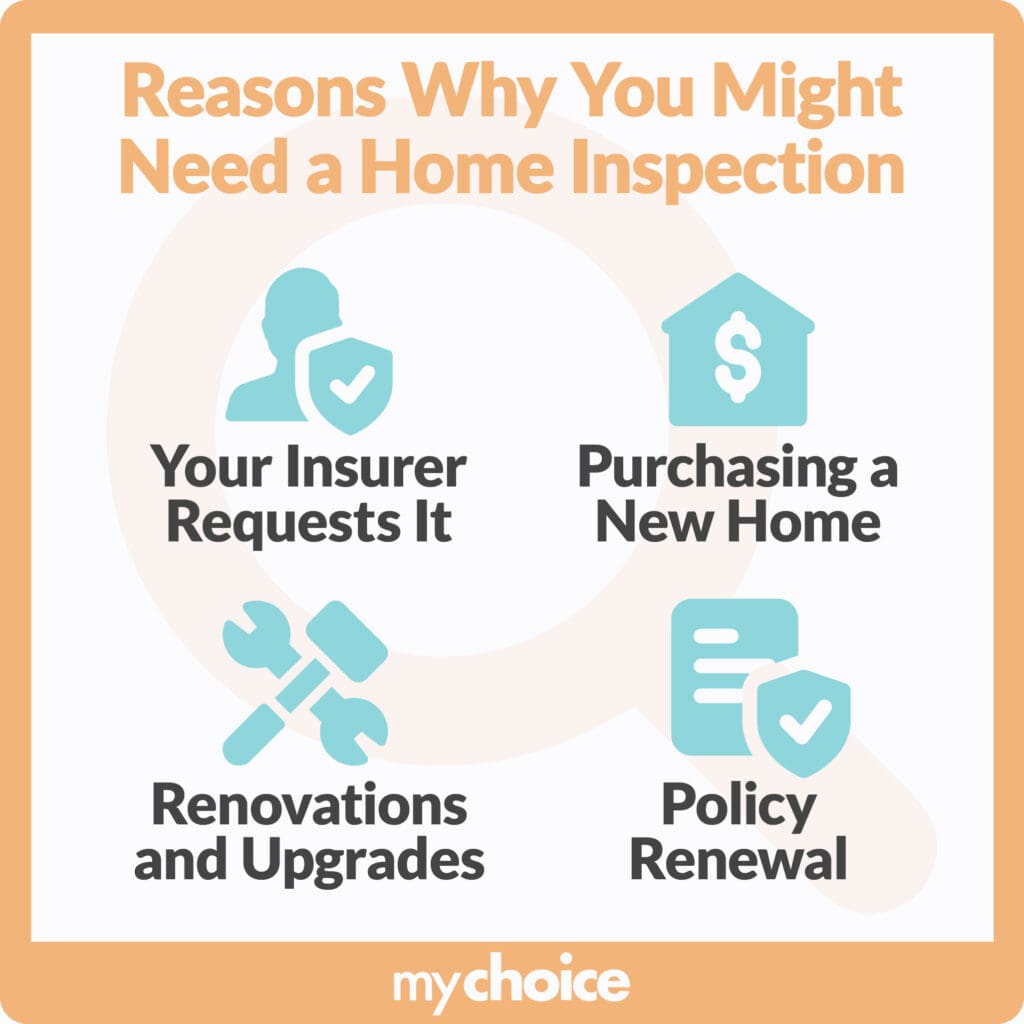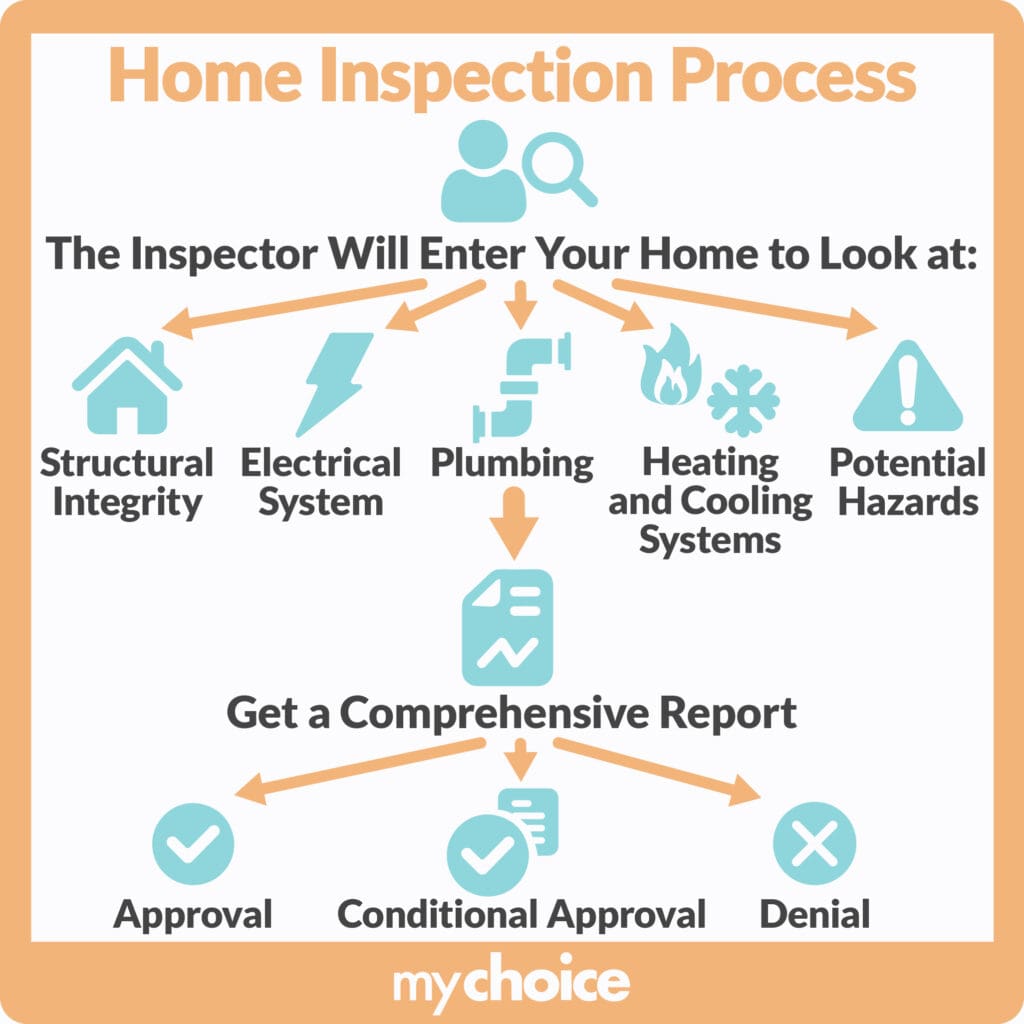Home inspections aren’t mandatory, but they’re highly encouraged by brokers and insurance providers. In some cases, such as when buying an older house or renewing a policy after major renovations, a home inspection is a prerequisite for obtaining insurance.
Home Inspections for Home Insurance at a Glance
- Home inspections are vital tests that help homeowners and insurers assess the value and safety of a property.
- Although home inspections are not pass-or-fail tests, they can determine whether you can get good insurance rates — or whether you can get insured at all.
- It’s important to prepare for a home inspection and find a qualified and reputable inspector.
Whether you’re looking to buy or sell a home or simply renew your insurance policy, a home inspection can help you get better deals, offers, and premium rates. Read on to discover how and what you can do to prepare for an inspection.
What Is a Home Inspection and How Does it Work?
Think of a home inspection as a health check-up for your home. An inspector will visit your home and perform a visual assessment to look for safety issues, risks, and areas needing immediate repair or replacement. Typically, an inspector examines the following features:
- Foundation and integrity
- Roof
- Windows
- Doors
- Exterior and interior walls
- Ceilings and floors
- Attics and basements
- Plumbing, heating, air conditioning, and electrical systems
- Ventilation systems
- Insulation
- Drainage
Upon completing the inspection, the inspector will provide a detailed report of their findings. If you’re selling your home, this report will clue you into any red flags that may drive future buyers away, as well as tell you what you can do to raise the value of your home.
For buyers, home inspections are a good way to gain some leverage. You get objective insight into the condition of a property, which you can use to negotiate the price and contract terms. For example, you’re considering buying a beautiful heritage house, but a home inspection reveals that it has knob-and-tube wiring, an old electrical system that’s considered high-risk by many insurers. You could compute the cost of insuring a high-risk home and/or replacing your electrical system and use it to justify a higher offer.
Do You Need a Home Inspection for Insurance?
In most cases, homeowners don’t need to get a home inspection to be eligible for home insurance. However, some insurance companies require inspections for homes that:
- Are over 25 years old
- Have not undergone an inspection in over 10 years
- Have undergone major repair work and renovations
You may also need a home inspection if you’re switching providers and if your insurance company can’t work out the replacement cost value of your assets.

What Do Insurance Companies Look For in Home Inspections?
Insurance providers look at the risks associated with a property. They consider key factors such as:
- The overall structural integrity of the property, from the roof to the driveway
- Safety hazards such as faulty wiring, out-of-date plumbing systems, and poor ventilation
- Fire hazards such as broken smoke detectors, old oil tanks, and improperly stored flammable materials
- Heating, ventilation, and air conditioning systems that could cause water leaks and damage
- Security features like locks, alarm systems, and security lights to deter theft and vandalism
- Environmental hazards such as overland water and flooding risks, proximity to earthquake fault lines, wildfires, and extreme temperatures like harsh winters and strong winds
- Animal or insect infestations that could destroy the property or pose health risks to inhabitants
- Mould or mildew growth
Upon evaluation, insurance companies can make an accurate assessment of the risks involved with insuring the property and provide a quote that makes sense for both the provider and policyholder.
Naturally, the fewer risks there are, the more likely you are to get standard coverage at competitive rates. On the other hand, if an inspector finds several deficiencies, your insurance provider may require you to remedy these issues before offering standard coverage. A provider may also offer high-risk insurance or add-on endorsements to cover certain areas.
Can You Fail a Home Inspection?
No marks are given for a home inspection, so you can’t exactly fail one. However, significant issues may set off alarm bells and cause your insurance company to raise your premium or even send a notice of policy cancellation. Bear in mind that insurance providers typically allow homeowners to fix these issues within a given timeframe.
When this happens, make sure to hire professionals and document all the changes you make. Your insurance provider will need proof that any repairs and replacements comply with the appropriate safety standards.
If your insurance company decides to cancel your policy, you can always search for a new provider. But bear in mind that you will likely need to undergo a new home inspection before you can qualify for insurance.
What Should You Expect From a Home Inspection?
Most people avoid getting a home inspection because they assume the process is too costly or time-consuming. In fact, it’ll only take a couple of hours to complete. Here’s what you can expect from a home inspection:
Cost
Most home inspections cost somewhere between $350 and $600, depending on your home’s size, age, and condition. The rate may increase if you need additional services like a mould inspection, sewer scope testing, pest inspection, water quality test, and the like.
Time
Home inspections can take about one to three hours to complete. Again, the length of time will depend on the size and age of your home.
Process
Home inspections are mostly visual assessments. This means that the inspector will spend most of their time walking through your home and property to assess any risks. As the homeowner or buyer, you must be present for the exam to ensure you can answer any of the inspector’s questions.

How to Choose a Home Inspector
Home inspectors are not required to hold a license, save for those practicing in Alberta and British Columbia. They do undergo training programs to understand home construction, maintenance, and operation, as well as know how to spot common defects.
When choosing a home inspector, look for the following qualities:
- Holds a license if required by your province or territory
- Has an accreditation showing training and experience
- Is part of an association for home inspectors, like the Ontario Association of Home Inspectors (OAHI) or the Canadian Association of Home and Property Inspectors (CAHPI)
- Provides references
- Provides written inspection reports
- Has experience inspecting the type of home you’re looking to buy or insure (i.e., condo, heritage home, cottage)
- Provides a written contract
Here are a few more tips for finding a good home inspector:
- Look the home inspector up on the Better Business Bureau: This’ll show you if the inspector has had any prior complaints or sanctions made against them.
- Request a sample report: Reports should be comprehensive but easy to understand. Photos and explanations are a plus.
- Request a written contract: This should outline all the features that need to be inspected, provide a deadline for the written report, and detail the total cost of the inspection process.
- Ask if the inspector has professional liability and worker’s compensation insurance: Personal liability coverage should ensure your inspector is protected should anything go wrong during the inspection, such as damage to your property or injury to you or the inspector.
How to Prepare for a Home Insurance Inspection
Preparing for a home inspection ensures that your assessment goes quickly, safely, and efficiently. Here are some ways you can prepare for an upcoming inspection:
Clean and Declutter
Clear entryways, walkways, and staircases of any obstructions, debris, and safety hazards. The inspection will go faster if the inspector can easily see and access all key areas of the home, including attics, basements, crawl spaces, and utility rooms.
Have Documentation on Hand
Your inspector will likely request paperwork like floorplans; documentation for security systems, safety devices, HVAC systems, etc.; and proof of repairs, renovations, and upgrades.
Make copies of all the necessary documents or compile them into an electronic file that you can email to your inspector.
Check Your Utilities
Make sure all utilities, such as water, gas, and electricity, are turned on and running properly. Inspectors typically test these systems for any issues like water and gas leaks, so it’s important to make sure they’re all connected during the inspection.
Note Areas of Concern
If there are any particular areas or features that you’re concerned about — like cracks in the foundation, mould, leaks, faulty wiring, or signs of water damage — make a list and make sure to point everything out to the inspector on the day of inspection.
Key Advice From MyChoice
Now that we’ve learned more about home inspections, here are some top tips to remember:
- Make sure you know the property inside and out so you can answer the inspector’s questions, raise important concerns, and provide all the necessary documents for a successful inspection.
- Be honest about the condition of your home — you don’t want to leave a bad impression on your insurance provider.
- Find a qualified and reputable home inspector to ensure a thorough assessment.








